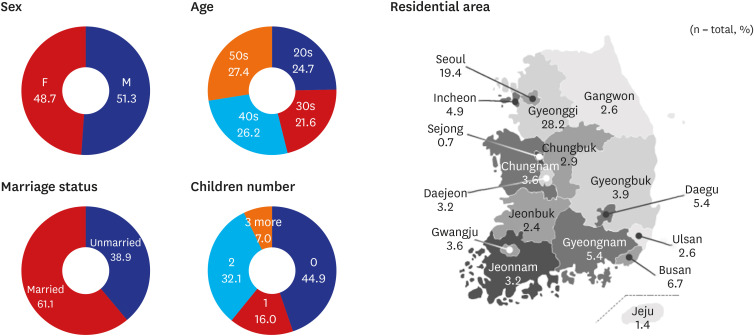J Korean Med Sci.
2022 Jun;37(25):e203. 10.3346/jkms.2022.37.e203.
A Survey on Public Perceptions of Low Fertility: A Social Research Panel Study
- Affiliations
-
- 1Division of Maternal-Fetal Medicine, Department of Obstetrics and Gynecology, Dongguk University Ilsan Hospital, Goyang, Korea
- 2Gallup Korea, Seoul, Korea
- 3Division of Maternal-Fetal Medicine, Department of Obstetrics and Gynecology, Korea University College of Medicine, Seoul, Korea
- KMID: 2530838
- DOI: http://doi.org/10.3346/jkms.2022.37.e203
Abstract
- Background
It was reported that South Korea showed the greatest decline in the fertility rate among the entire OECD countries over the last 30 years with the total fertility rate (TFR) of 0.84 persons in 2020. Despite the efforts of the Korean government, the TFR has decreased constantly. This study intended to analyze the perception of Koreans toward pregnancy and childbirth regarding the low fertility rate in South Korea for understanding the causes of constantly decreased low fertility.
Methods
This study carried out an online survey based on 1,002 men and women aged 19 to 59 years old for six days from October 21 to October 26 in 2021 in cooperation with Gallup Korea. This study analyzed the perception of people toward low fertility, the severity of low fertility, and level of interest in low fertility to inspect awareness of the severity of low fertility in South Korea through a survey.
Results
It was found that 62%, 52%, and 72% of entire participants, women, and men agreed on a question “It is better to get married”. As for women’s age, a positive response for this question was derived from 34.2% (20s), 43.1% (30s), 53.4% (40s), and 71.4% (50s), respectively (P < 0.001). In a question “the necessity of children”, a positive response for this question was derived from 34.7% (20s), 58.3% (30s), 75.9% (40s), and 83.5% (50s) of female respondents, respectively (P < 0.001). Positive responses were shown 39.2%, 60.0%, 79.7%, and 81.5% of female participants in their 20s, 30s, 40s, and 50s agreed on the question “My children make me happy in my life”, respectively (P < 0.001).
Conclusion
This study found that a decrease in the TFR was affected mainly by the negative perception of women in their 20s and 30s toward marriage, childbirth, and the necessity of children. Therefore, further research should be conducted to develop policies that focus on these significant variables to overcome the worsening low fertility problem.
Figure
Cited by 1 articles
-
Factors associated with future fertility intentions among Korean women of childbearing age in Seoul: a cross-sectional study
Thi Thanh Lan Nguyen, Van Cuong Nguyen
Womens Health Nurs. 2024;30(4):288-298. doi: 10.4069/whn.2024.12.06.1.
Reference
-
1. Statistics Korea. Results of birth and death statistics in 2020. Updated 2021. Accessed March 20, 2021. http://kostat.go.kr/portal/korea/kor_nw/1/2/3/index.board?bmode=read&bSeq=&aSeq=388265&pageNo=1&rowNum=10&navCount=10&currPg=&searchInfo=&sTarget=title&sTxt= .2. Kang DS, Kim MG, Kim JI, Lee SY, Lee SL, Lee KH, et al. Integrated Policy Measures to Respond to the Low Fertility Rate. National Research Council for Economics Humanities and Social Sciences Collaborative Research Series 20-16-01. Seoul, Korea: National Research Council for Economics Humanities and Social Sciences;2021.3. Presidential Committee on Ageing Society and Population Policy. The Fourth Plan on Low Birth and Ageing Society (2021–2025). Sejong, Korea: Ministry of Health and Welfare;2020.4. Kim KS, Heo GH, Kim YS, Kim SM. Analysis of Current Economic Issues No. 94: Causes and Economic Impact of the Low Fertility Rate in Korea. Seoul, Korea: National Assembly Budget Office;2018.5. Kim JH, Lee SY, Choi IS. A Study on Necessity and Feasibility of a New Panel Dataset for Population Policy. Sejong, Korea: Korea Institute for Health and Social Affairs;2018.6. Won JW, Lee SY. Analysis of Effectiveness of Low Fertility Policy. Sejong, Korea: Korea Institute for Health and Social Affairs;2017.7. Kim SW. Low Fertility Measure Evaluation II (Priority of Policy). Seoul, Korea: National Assembly Budget Office;2016.8. Kang DS. Integrated Policy Management Plan. National Research Council for Economics Humanities and Social Sciences Collaborative Research Series 18-40-01. Seoul, Korea: National Research Council for Economics Humanities and Social Sciences;2018.9. Kim EJ, Song HJ, Bae HJ, Sun BY, Choi JH, Hwang JM. A Study on Paradigm Shift in Response to Low Fertility Policy (I): Analysis of the Gendered Life Prospects and Policy Coherence of Young People. Seoul, Korea: Korean Women’s Development Institute;2019.10. Kim J, Song HJ, Bae HJ, Choi JH, Sung K, Hwang JM, et al. A Study on Paradigm Shift in Response to Low Fertility Policy (II): Reconstruction of Discourses to Respond to Low Fertility. Seoul, Korea: Korean Women’s Development Institute;2019.11. Kim EJ, Jung GW, Song HJ, Kang MJ, Kim NJ, Choi YJ, et al. A Study on the Establishment of Mid- to Long-term Countermeasures for Low Fertility: Focusing on ‘A Society Where We Work Together and Care for Each Other’. Seoul, Korea: Korean Women’s Development Institute;2020.12. Go KH. A Study on the Distribution of Functions Between Central and Local Governments in Low Fertility Policies. Wonju, Korea: Korea Research Institute for Local Administration;2017.
- Full Text Links
- Actions
-
Cited
- CITED
-
- Close
- Share
- Similar articles
-
- Research on the Perceptions of Low Vision Rehabilitation
- Knowledge regarding factors that influence fertility in Thai reproductive-age population living in urban area: A cross-sectional study
- Changes in Public Health Perceptios after the Outbreak of Coronavirus Disease-19 among the Gangwon Province Residents Focusing on the Results of the Gangwon Province Residents’ Panel Survey 2019-2020
- A Study on the Social Perceptions of the Baby Box and Infant Abandonment
- Public Perceptions of Male Hormone Levels and Prostate Health: A Text Mining Analysis of South Korean Media and Online Communities


